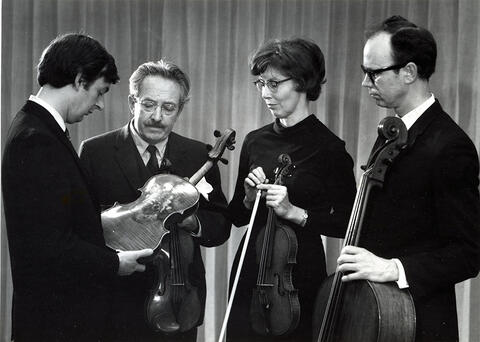
Área de título y declaración de responsabilidad
Título apropiado
Amati Quartet - Musicians
Tipo general de material
- Graphic material
Título paralelo
Otra información de título
Título declaración de responsabilidad
Título notas
Nivel de descripción
Item
Institución archivística
Código de referencia
Área de edición
Declaración de edición
Declaración de responsabilidad de edición
Área de detalles específicos de la clase de material
Mención de la escala (cartográfica)
Mención de proyección (cartográfica)
Mención de coordenadas (cartográfica)
Mención de la escala (arquitectónica)
Jurisdicción de emisión y denominación (filatélico)
Área de fechas de creación
Fecha(s)
-
1969 (Criação)
Área de descripción física
Descripción física
1 photograph : b&w ; 18 x 13cm
1 negative 12.5 x 10cm
Área de series editoriales
Título apropiado de las series del editor
Títulos paralelos de serie editorial
Otra información de título de las series editoriales
Declaración de responsabilidad relativa a las series editoriales
Numeración dentro de la serie editorial
Nota en las series editoriales
Área de descripción del archivo
Nombre del productor
Historial de custodia
Alcance y contenido
Standing and holding their instruments and looking at the back of one of them are (l to r): Robert Klose, Murray Adaskin, Norma Lee Bisha and Edward Bisha.
Bio/Historical Note: Three string quartets bearing the name Amati have been based in Canada. Two separate Amati string quartets have performed on 17th-century instruments built by the Amati family of Italy, and owned by the University of Saskatchewan in Saskatoon. A third unrelated Amati String Quartet was based in Ontario, primarily Toronto, from 1985 to 2000. This first Amati String Quartet was founded in 1968 by Murray Adaskin and three other faculty members of the University of Saskatchewan: Norma Lee Bisha (second violin), Michael Bowie (viola), and Edward Bisha (cello). It gave its first concert on 2 February 1969. Later that same year, Robert Klose was named second violin and Norma Lee Bisha replaced Michael Bowie. The personnel remained stable until the group was supplanted in 1971 by the Canadian Arts Trio after fewer than 10 formal concerts. The quartet was too short-lived to develop a wide repertoire or a distinctive style. The University of Saskatchewan Amati Quartet in Residence was established in August 2003 and also played on the university’s Amati instruments. This quartet had previously been known as the Cole Quartet. The initial members were Marla Cole (1968-2017) first violin), Michael Swan (second violin), Geoff Cole (viola) and Linda Bardutz (cello). In 2004, Luke Hnenny became second violinist and Peter Hedlin replaced Bardutz as cellist. The Amati Quartet performs a yearly recital series, including a Thanksgiving Monday concert, and plays at various University of Saskatchewan events. It performed for Queen Elizabeth II in honour of Saskatchewan’s 100th anniversary in May 2005, and since its opening season has undertaken a project to perform all of Haydn’s string quartets. The Amati instruments at the University of Saskatchewan — one violin built in 1627, another violin built in 1637, the viola in 1607 and the cello in 1690 — are the only set in Canada built by the Amati family of Cremona. The viola’s back bears the painted crest of the Borghese family that commissioned it. All were purchased by Kindersley, Sask. collector Stephen Kolbinson (1888-1986) and sold to the university in 1959 for $20,000 on the condition that the university establish an Amati string quartet. The Canadian Arts Trio (active 1971–1975) — which comprised Robert Klose (violin), Edward Bisha (cello) and Robin Harrison (piano) — used two of the four Amati instruments owned by the university. The Amati instruments were lent to Victoria's Lafayette Quartet 1992-1998. They have also occasionally been played by members of the Saskatoon Symphony Orchestra. The estimated value of the instruments is approximately $3 million (2020).

